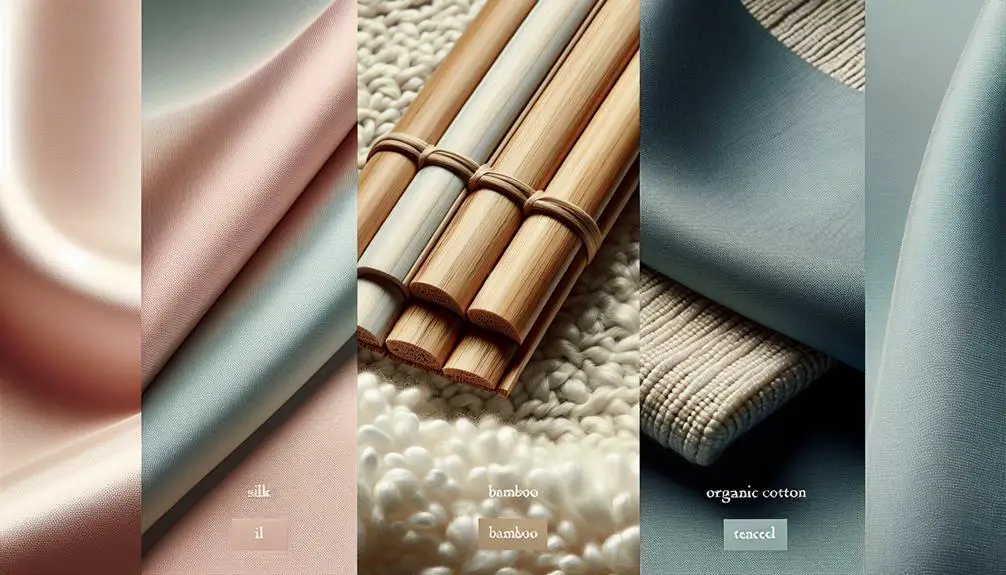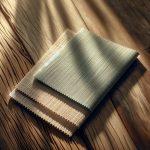Did you know that nearly 20% of the population has sensitive skin, making the choice of fabric important? If you've ever struggled with skin irritation, you understand the significance of hypoallergenic materials. While options like cotton, bamboo, and silk often come to mind, there are other fabrics that might surprise you with their benefits. Have you considered the hypoallergenic properties of linen or the eco-friendly nature of Tencel? Exploring these fabrics could make a significant difference in your comfort and skin health. Let's uncover what sets each of these materials apart and why they might be the perfect choice for you.
Table of Contents
Key Takeaways
- Cotton is soft, breathable, and durable, reducing skin irritation and discomfort.
- Bamboo fabric is eco-friendly, durable, and hypoallergenic, with excellent moisture-wicking properties.
- Silk offers luxurious feel, breathability, and hypoallergenic benefits, minimizing skin irritation.
- Linen is breathable, hypoallergenic, and moisture-wicking, making it perfect for sensitive skin.
- Tencel is sustainable, biodegradable, and moisture-wicking, providing softness and comfort for sensitive skin.
Cotton
Cotton is often celebrated for its softness and breathability, making it a top choice for those with sensitive skin. You'll find that cotton's gentle touch can help reduce irritation and discomfort, offering a soothing experience throughout the day.
But there's more to cotton than just comfort. This fabric's durability guarantees that your clothes and bedding withstand frequent washing without losing their quality, which is crucial for maintaining a hypoallergenic environment.
Beyond its durability, cotton's versatility makes it essential in your quest for hypoallergenic fabrics. Whether you're looking for casual wear, formal attire, or bed linens, cotton can adapt to various needs. It's available in a wide range of weaves and finishes, allowing you to choose the best option for your specific requirements.
With cotton, you don't have to compromise style for comfort; you can enjoy both.
Bamboo
Bamboo fabric offers a unique blend of softness and moisture-wicking abilities that make it an excellent choice for sensitive skin. When you choose bamboo clothing, you're not just selecting comfort; you're also making an environmentally conscious choice. Bamboo grows quickly and doesn't need pesticides, reducing its environmental impact to a lower level than other crops.
If you're comparing bamboo vs cotton, you'll discover that bamboo fabric often outperforms cotton in terms of durability. Bamboo fibers are naturally strong and resilient, meaning your bamboo clothing will probably last longer and maintain its quality through numerous washes.
Here's a quick comparison to help you grasp the advantages:
| Feature | Bamboo Clothing | Cotton Clothing |
|---|---|---|
| Softness | Ultra-soft | Soft |
| Moisture-wicking | Excellent | Moderate |
| Environmental Impact | Low | Moderate to High |
| Durability Comparison | High | Moderate |
Choosing bamboo clothing can notably enhance your comfort and well-being if you have sensitive skin. The fabric's hypoallergenic properties help decrease the risk of irritation, while its breathability keeps you cool and dry. By selecting bamboo, you're not just investing in your comfort but also making a positive contribution to the environment.
Silk
Silk fabric is renowned for its luxurious feel and hypoallergenic properties, making it an excellent choice for those with sensitive skin. Its smooth texture reduces friction against your skin, minimizing irritation and helping maintain your skin's natural moisture level.
To fully appreciate silk's benefits, it helps to understand a bit about its production process. Silk is produced by silkworms, which spin fine threads that are later woven into fabric. This natural process results in a material that's both breathable and gentle on your skin.
When choosing between silk vs satin, remember that while satin can mimic silk's smoothness, it's often made from synthetic fibers that may not offer the same hypoallergenic properties or breathability.
To maintain your silk garments, follow these silk care tips:
- Hand Wash or Gentle Cycle: Use cold water and a mild detergent.
- Avoid Direct Sunlight: Dry your silk items in the shade to prevent fading.
- Iron Low: Use a cool iron setting or steam to remove wrinkles.
- Store Properly: Keep silk in a cool, dry place, away from moths.
Linen
You'll find linen to be a top choice for sensitive skin due to its natural fibers.
This fabric offers excellent breathability, ensuring you stay cool and comfortable.
Plus, linen's hypoallergenic properties make it a gentle option for anyone prone to irritation.
Natural Fiber Benefits
Linen offers numerous benefits for those with sensitive skin, including its natural breathability and hypoallergenic properties. As you explore eco-friendly options and sustainable fashion, linen stands out as a top choice. Its ability to regulate temperature makes it ideal for hypoallergenic bedding and skin-friendly textiles.
Here are four key benefits of linen for sensitive skin:
- Hypoallergenic: Linen is naturally hypoallergenic, reducing the risk of skin irritations and allergic reactions. It's perfect for those who suffer from conditions like eczema or allergies.
- Eco-friendly: Linen is made from the flax plant, which requires fewer resources to grow compared to cotton. This makes it a sustainable fashion choice that's kind to both your skin and the planet.
- Durable: Linen is one of the strongest natural fibers. It becomes softer with each wash, ensuring long-lasting comfort and making it a wise investment for hypoallergenic bedding.
- Moisture-wicking: Linen's natural fibers absorb moisture without holding bacteria, keeping your skin dry and reducing the likelihood of breakouts or rashes.
Breathability and Comfort
With its unmatched breathability, linen keeps you cool and comfortable, making it an excellent choice for sensitive skin. When you choose linen, you're opting for a fabric that excels in fabric softness and durability.
Its natural fibers allow air to circulate freely, reducing the risk of overheating and ensuring you remain at ease throughout the day. This breathability is particularly beneficial if you struggle with skin irritation or are prone to allergies, as it helps to prevent the build-up of moisture and allergens that can exacerbate these issues.
Linen's hypoallergenic properties make it a standout fabric for anyone looking to minimize skin irritation. The fabric's smooth texture reduces friction against your skin, further preventing irritation.
Plus, linen is highly durable, so it withstands frequent washes without losing its beneficial qualities, maintaining its softness and breathability over time. This means you won't have to compromise on comfort or protection, even with regular use.
Ultimately, linen offers a perfect blend of comfort and practicality, making it an exceptional fabric choice for those with sensitive skin. By investing in linen, you're ensuring your skin stays cool, comfortable, and protected from potential irritants.
Hemp
Hemp fabric stands out as a highly durable and breathable option for those with sensitive skin. Known for its hypoallergenic properties, hemp guarantees you stay comfortable without triggering any skin irritations. This fabric isn't only gentle on your skin but also on the environment, thanks to its sustainable farming practices and minimal environmental impact.
When you choose hemp, you're opting for a fabric that excels in several areas:
- Durability: Hemp fibers are incredibly strong, making the fabric last longer and withstand more washes than many other materials.
- Breathability: The natural fibers allow air to circulate, keeping your skin cool and reducing the risk of irritation.
- Antibacterial Properties: Hemp naturally resists bacteria and mold, which can help prevent skin conditions and maintain fabric freshness.
- Eco-Friendly: Hemp requires fewer pesticides and less water compared to cotton, making it a more sustainable choice.
Tencel
You'll appreciate Tencel for its natural fiber origins, making it an excellent choice for sensitive skin.
Its moisture-wicking properties help keep you dry and comfortable throughout the day.
Plus, Tencel is known for being incredibly soft and gentle.
Natural Fiber Origins
Tencel, derived from sustainably sourced wood pulp, offers a soft and eco-friendly option for those with sensitive skin. As you seek wool alternatives that are gentle and hypoallergenic, Tencel stands out due to its natural origins and minimal environmental impact.
The process of producing Tencel fibers involves transforming wood pulp into a versatile fabric using a closed-loop system that recycles water and solvents, ensuring an eco-conscious choice.
Here are four reasons why Tencel should be on your radar:
- Sustainable Source: Tencel is made from eucalyptus, beech, or spruce trees, which are fast-growing and require less water and pesticides compared to conventional crops.
- Closed-Loop Production: The manufacturing process recycles nearly 100% of the solvents, making it highly efficient and reducing waste.
- Biodegradable: Unlike synthetic fibers, Tencel is fully biodegradable, meaning it will break down naturally without harming the environment.
- Softness and Comfort: Tencel's smooth fibers provide exceptional comfort, making it an excellent choice for sensitive skin prone to irritation.
Moisture-Wicking Properties
Beyond its sustainable and soft qualities, you'll appreciate Tencel's impressive moisture-wicking properties that keep your skin dry and comfortable. This fabric's ability to efficiently absorb moisture makes it a top contender among allergen-resistant fabric choices. When you wear Tencel, sweat is swiftly drawn away from your skin, reducing the risk of irritation and breakouts often caused by dampness.
Tencel is particularly skin-friendly, making it a standout textile option for those with sensitive skin. Its smooth fiber surface feels gentle against your skin, minimizing friction and the potential for allergic reactions. The moisture-wicking properties of Tencel also contribute to a cooler, more breathable wearing experience, which is invaluable during warmer months.
To help you understand Tencel's benefits better, here's a quick comparison:
| Feature | Tencel Benefits |
|---|---|
| Moisture-Wicking | Keeps skin dry and comfortable |
| Allergen Resistant | Reduces risk of allergies |
| Skin-Friendly | Gentle on sensitive skin |
| Breathability | Enhances comfort in warm weather |
| Smooth Fiber Surface | Minimizes friction and irritation |
Frequently Asked Questions
How Do I Test a Fabric for Hypoallergenic Properties at Home?
Like Sherlock Holmes, you can uncover fabric sensitivity. Use DIY fabric allergy tests by placing the fabric on your skin for 24 hours. Check for redness or itching to determine if it's hypoallergenic.
Are Hypoallergenic Fabrics Suitable for Babies With Sensitive Skin?
Yes, hypoallergenic fabrics are suitable for babies with sensitive skin. They minimize fabric allergies, ensuring your baby's clothing doesn't irritate their delicate skin. Choosing hypoallergenic materials is essential for infants with skin sensitivity.
Can Hypoallergenic Fabrics Help With Eczema or Other Skin Conditions?
Yes, hypoallergenic fabrics can provide eczema relief and aid allergy prevention. You'll find that these materials reduce irritation and discomfort, creating a more manageable environment for your skin conditions, promoting overall well-being.
How Should Hypoallergenic Fabrics Be Washed and Cared For?
To guarantee allergen prevention and fabric durability, follow specific washing instructions. Use mild detergent, avoid fabric softeners, and wash in cool water. For proper fabric maintenance, air dry or use a low-heat setting.
Are There Any Specific Brands Known for Hypoallergenic Fabric Clothing?
Yes, there are popular brands with hypoallergenic options. Look into companies like Cottonique and Silkbody. They use rigorous fabric testing, but you can also use DIY methods to confirm their hypoallergenic properties suit your skin.
- Tetron Fabric for Marine Applications: Durability and Use Cases - June 18, 2025
- Tetron Fabric for Outdoor Furniture: Weather Resistance and Care - June 18, 2025
- Tetron Fabric for Wall Coverings: Style and Application Tips - June 18, 2025







